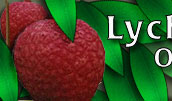Tips for Selecting a 3-7 Gallon Lychee Tree
By Krystal Folino and Bill Mee
CONTAINER SIZE
Ideally you want a 3 or 7 gallon container size lychee tree. At this size your lychee tree will grow rapidly, should begin fruiting the 1st season and are easy to transplant and transport. If you can obtain a lychee tree in a 10-15-25 gallon container this is even better because you are several years ahead on the growing curve with a larger more mature tree. A larger lychee tree is hardier and more resistant to freezes, floods, hurricanes, droughts, pests etc.; however, 10 - 25 gallon containers may require special transportation or delivery charges.
Lychee trees in 1 gallon containers are just too small to be practical and will take a few years to start producing fruit. Avoid 1 gallon lychee trees unless you don't care about the fruit or unless you are a wholesale nursery buying hundreds of trees and have the facility to take care of the trees until they are mature enough to resell.
ROOT SYSTEM
One of the most important parts of a lychee tree is the root system. Buy a tree with a well developed root system that you can pick up by holding the trunk and, if possible, one that has been inoculated or grown or even air layered with mycorrhizal fungi.
If the lychee tree appears floppy this implies that the tree has a weak root system. Sometimes trees grown in containers are planted in inadequate soil mixes that either do not drain properly or do not retain enough moisture. This can lead to root rot or inadequate root development. If you happen to obtain a "floppy" tree you should replant it in well draining organic soil, cover the top with mulch or sphagnum (except the root crown), apply MycoStim or other mycorrhizal fungi to the roots and stake the tree up until it can re-grow it's root system.
SOIL
Healthy soil is one of the most important aspects of growing a lychees tree. Look for trees with dark brown, rich organic soil that appears to drain well. Woody, organic compost soil that drains well, but still absorbs and retains moisture is the preferred soil type for mycorrhizal fungi which live symbiotically in the soil around the lychee roots. Mycorrhizal fungi feeds on the excess "left overs" from photosynthesis that the lychee tree will not consume and in exchange both protects the roots from soil pathogens and increases the nutrient and water absorption of the lychee tree's roots. . Avoid trees with gray soil or soil with perlite, vermiculite or other artificial components.
If you can get a lychee grown organically or semi organically the soil will be much better because traditional NPK fertilizer and non-organic pesticides kill beneficial micro-organisms and compromise nutrients necessary for healthy lychee tree growth and are major causes of barren hard pan soil.
TREE HEIGHT
Lychee trees in 3 gallon containers should generally be 3 - 4 feet tall and lychee trees in 7 gallon containers should be 5 - 6 feet tall, depending on the variety and desired use. Emperors or other slow growing varieties are usually 2 - 3 feet tall. After 7 to 10 years the tree, if properly cared for, will reach heights in excess of 12 feet. You do not want a tree that becomes too high as you cannot get to the fruit easily without either a grove ladder or cherry picker.
CANOPY
Select a tree with a canopy of at least 2 feet in width. When planted the canopy diameter is roughly equivalent to the root system diameter. Lychee trees develop a beautiful hemispherical shaped canopy over time, although some varieties such as the Hak-yip has more vertical branching and varieties such as the Mauritius have more lateral branching. Select trees whose upper branch structure is more likely to develop into this optimal dome shape.
TRUNK
Look for trees with 1 to 2 feet of solid trunk before a bifurcation or trifurcation. Trees with this amount of trunk are less likely to split in high winds. Select a tree for maximum trunk diameter. The trunk diameter should be as least ¾ inch for a 3 gallon container and 1 inch for a 7 gallon container. The larger the trunk diameter, the older the effective age of the tree.
If possible select an upright tree with a balanced canopy and not a lopsided one. Air layers, the primary propagation method for lychee trees, are inherently lopsided as they are derived from branches growing in the direction of sunlight. Lopsided lychee trees can be repotted and pruned to create a tree with a balanced habit of growth.
Try to avoid buying a tree with evidence of barkminer moth larvae; however it will not hurt or damage your tree. Branches infested with this barkminer become covered with rough, brownish lesions which range in size from six to 18 millimeters. The larval stage of the barkminer moth irritates the outer bark of stems, branches, and the trunk of lychee trees resulting in cork-like lesions. No apparent economic damage from this larvae has been observed, it is not contagious to other trees and control is not recommended.
AIR LAYERED OR GRAFTED
Buy lychee trees grown out from air layers or grafting. Air layered lychee trees grow and fruit more vigorously whereas grafted trees tend to grow very slowly and remain small. This makes grafted trees, when you can find them, good candidates for container growing or where size and space is an important consideration.
Don't buy a lychee tree grown from a seed. While a seedling tree may look nice and is fun to grow it is unlikely that it will produce fruit for many years (as much as 15 or even 25 years) and the fruit may be inferior to the parent variety. There has quite a bit of trouble among horticulturalists and lychee growers at identifying lychee varieties even to the point of DNA testing. Seedlings confuse varieties and degrade the high quality fruit characteristics that lychee growers try to achieve and lychee enthusiasts come to expect.
EMERGENT BUDS
Lychee trees with new growth flushes suggest a healthy tree and established root system. Select a tree with newly emerging buds, growth flushes or bloom spikes if possible. Keep the tree's tender new growth away from wind or chewing insects and apply Phyto-Fos or other foliar phosphorous to help promote healthy new growth.
LEAVES
Select a lychee tree with healthy dark green leaves. The dark green represents the hardened off dormant state of the leaves. Small light green or reddish leaves are characteristic of new growth flushes. Avoid selecting trees with yellow (chlorotic) leaves and leaves with as little tip browning as possible. Some varieties have large leaves like the Sweetheart and some have small, compact leaves like the No Mai Tze.
VARIETY/CULTIVAR
Brewster and Mauritius are the primary commercial varieties in Florida. Mauritius fruits earlier and more reliably and Brewster has superior fruit. Brewster trees have some of the strongest wood whereas Mauritius trees have softer wood and thinner branches that split easily in high winds or when subjected to climbing animals such as raccoons or worse, people (during lychee season).Brewster and Mautitius are commercial varieties and great starter landscape lychees. Emperor is the best container variety because it's is slow growing, has a compact growth structure and does not require as much water as other varieties.
by Bill Mee & Krystal Folino - Lychees Online
Are you a lychee enthusiast? Get your FREE Lychee Idea-Kit or browse hundreds of lychee recipes, photos, tips and articles on eating and growing lychees at the Lychees Online Website
http://www.lycheesonline.com
Webmasters, editors, publishers, press, growers, marketers, etc. are free to reprint this article as long as it's reprinted in its entirety and the signature line remains intact.
Please direct a courtesy copy to info@lycheesonline.com or snail mail it to:
Lychees Online
4778 Stono Links Drive
Hollywood, SC 29449
Related Articles:
Back To Lychee Info
Back To Home Page
|
|
|
Copyright © 1999-2010 Lychees Online
info@lycheesonline.com www.lycheesonline.com (954)648-6020
|

